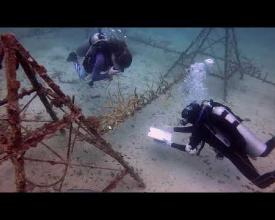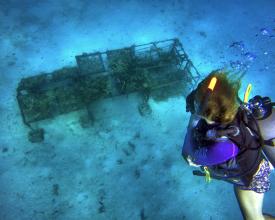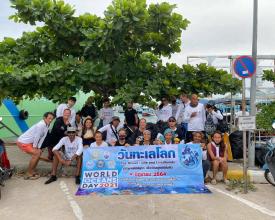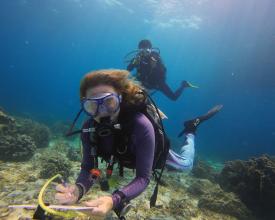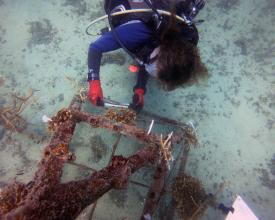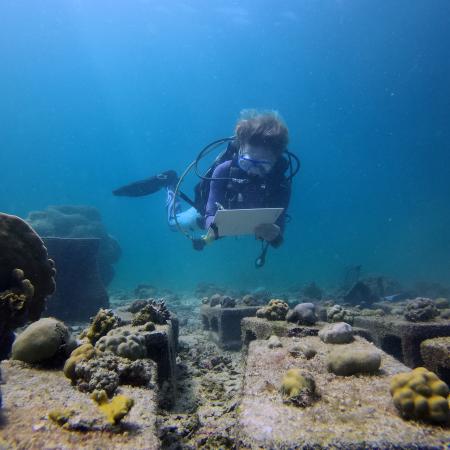
Coral Restoration Program
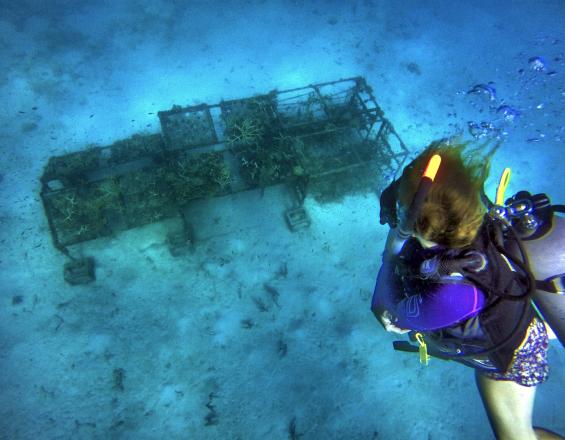
In 2010, we began our first coral restoration process with coral nurseries provided by the Department of Marine and Coastal Resources in Koh Tao, Thailand. We have expanded the area to 200 square metres, building artificial structures to act as substrate for coral to be permanently transplanted with coral fragments.
Using long term monitoring and maintainance, including photographs and measurement data, we can assess the health and provide research into coral growth rates in different environments.
Context
Challenges addressed
- Decline in health of the coral reefs around the island due to climate change issues such as ocean acidification and sea temperature rising.
- Damaging fishing practices due to overfishing, use of trawling nets or no quota regulation.
- Boat anchoring on coral reefs causing large impact damage.
- Inappropriate rubbish disposal by throwing trash overboard at sea, or on the streets and beaches on land.
Location
Process
Summary of the process
Combining governmental departments and local communities with our research programs and sustainable practices helps bringing awareness to the threats that the marine ecosystem faces and how it will affect them in the future. By making the local communtiy and stakeholders more aware of the reef ecosystem and educating them of how our behaviors can affect the health of the ocean, they are learning to understand the importance to keeping it healthy (Building Block 1).
Involving the government to approve our practices, enables us to conduct our restoration activities without any legal issues (Bulding Block 2). By conducting coral restoration (Building Block 3) and other marine based activites we also help improve fish population as juvenile fish use coral reefs for protection.
Using our holistic approach, encompassing all aspects that affect the marine ecosystem, helps the local community see a longer term view using sustainable practices to keep a healthy ecosystem for their tourism and food industry.
Building Blocks
Stakeholder Awareness
Through our community events and actions, locals and tourists can be better educated about how to reduce their impact on their local environment.
Using social media and outreach efforts, we have improved the stakeholders understanding of the need to look after their environment in the long term, as their economy lies so heavily on it.
Enabling factors
- Communication
- Education
- Outreach
Lesson learned
Its important to realise that stakeholders actions will not change overnight. Relationships need to be formed over time and an understanding of their traditional methods of ocean activities must be acknowledged.
Showing local stakeholders better practices which are cost free gives them the opportuntity to see that change doesnt necessarily have to affect them financially.
Governmental Approval
Some of our programs involve coral transplantation. In Thailand it is illegal to touch or damage coral, so we had to seek approval for some of our programs.
To receive approval from the government involves first submitted a proposal for a coral reef restoration zone. Including with this proposal are the techniques for transplantation, the people involved and their experience and qualifications, and a long term plan for monitoring and maintenance.
The DMCR has fully approved our restoration related activities and we conduct transplant research and provide them with that data.
Enabling factors
- Coral restoration experience
- Long term plan
- Proposal to government
- Assessment and approval
Lesson learned
This is a long process to get approved. Being able to show that our programs are successful and being assessed and approved took over 2 years of communication, submissions, and assessments.
To be able to obtain permission requires a group of committed volunteers that have relevant experience and are willing to participate in the program for a long term period of time.
Coral Restoration
Only govermentally approved people are allowed to conduct these activities, however we do involved non-approved divers and non divers to assist in Coral restoration to help with maintenance work that does not involve collection or transplantation of any coral fragments (like cleaning coral tags etc)
Coral fragments are collected around the reef edge. These "corals of opportunity" are broken fragments that will enventually die if we do not collect them. Once collected, they are transplanted to artificial structures to help increase the coral diversity and population.
Some corals are adopted as part of our Adopt A Coral Program.The adopted coral is transplanted and named, then monitored, photographed and measured every 3 months. The data is published online and is freely available for research into coral growth. This program also helps provide data into coral growth and health states.
Enabling factors
- Goverment approval
- Social media
- Environmentally minded individuals
- Logistics (scuba diving, dive boats)
Lesson learned
The actual process of transplantation is quite simple. The other factors that we did not take in to account initially is the time that is required to keep the areas clean of fouling organisms, collect measurement data and photography records of corals. All the post care maintenance is vitally important to secure a high survival rate of coral transplants.
Impacts
Changing behaviours of fishing practices, boat anchoring and rubbish disposal to a more sustainable process also helps keeping the reef healthier.
- Increase awareness on local and govermental level.
- New zones for coral restoration.
- Shared knowledge to increase research.
- Increase in protection laws.
Our Adopt A Coral program started in 2016, enabling divers and non divers to learn and contribute to our coral restoration efforts. All data we collect from the program is published online and is freely available for research into coral growth.
By conducting coral restoration and other marine based activites we also help improve fish population, as juvenile fish use coral reefs for protection.
Beneficiaries
- Tourists benefit with better quality diving.
- Local community economically better in long term.
Story

Arriving on the island of Koh Tao in 2009 to complete professional diver qualifications, we soon saw a need for an environmentally focused group. Joining with others to create a marine conservation organisation, we began looking at ways to help the degrading and abused coral reefs around the island.
We began to create programs to educate and involve tourists and the local community, to show them that there were alternative ways to do things that would make the ecosystem better and would economically be beneficial to them. We began with very small goals, such as a campaign to ban single use plastics, beach clean ups and a small research area underwater where we could conduct research on coral growth. Today, this area has expanded to a 200sqm area that is fully approved by the Department of Marine and Coast Resources.
Our Adopt A Coral program began in 2016, where divers and non divers could contribute to coral restoration by partially funding the process of coral transplantation. We conduct regular surveys of all the coral adoptions with measurements and photographs published online every 3 months. Sharing knowledge with other like minded organisations has led to many areas of the island being zoned for restoration purposes and regulations against fishing and anchoring, and we work together on major projects with the government to continue to implement changes to improve the ecosystem.
With the community more aware of the environmental impacts that they can help to increase the health of our coral reefs, benefitting local stakeholders and tourism satisfaction.

